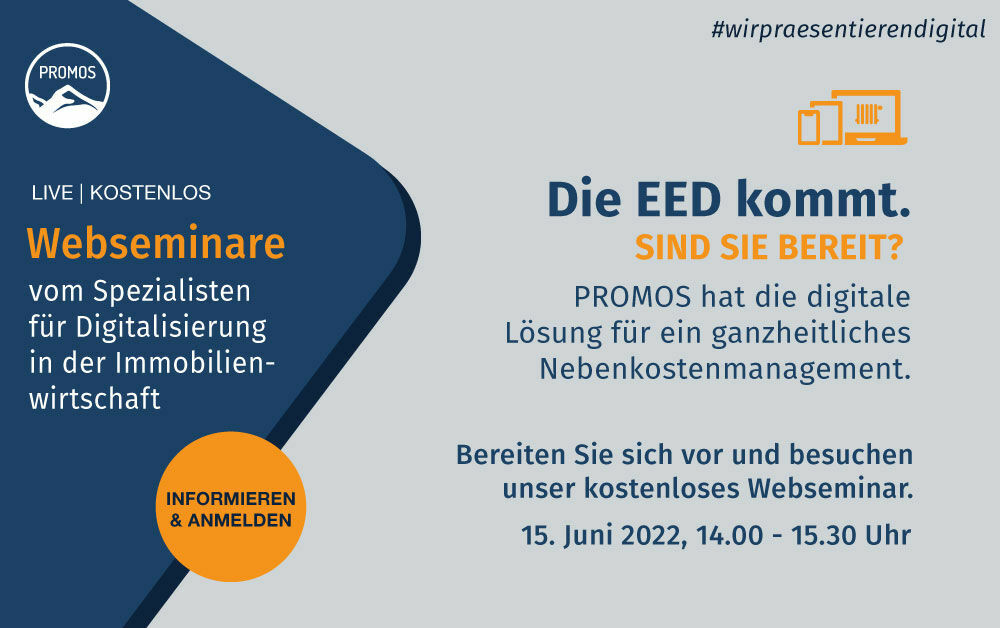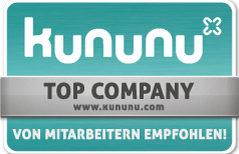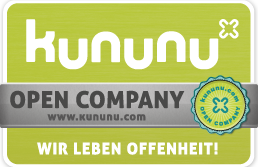Spotlight on EED – PROMOS takes stock
With the amended German Heating Costs Ordinance (HKVO), the Energy Efficiency Directive (EED) was implemented in national law in November 2021, giving rise to clear calls to action for reducing energy consumption in buildings. Aiming to support companies in implementing the obligation to provide information to tenants and residents throughout the year, PROMOS already provided information about the offer of a flexible EED/consumption data solution back in December 2021. In the continuation of the interview, we speak again to Dirk Krause, Head of Business Development and Partner Management, about the challenges that have arisen in the project up to now and provide insights into important lessons learned.
PROMOS News: Mr Krause, the first quarter is now behind us. Can you provide an initial assessment of how the projects are progressing so far?
Dirk Krause: Things are going very well. We have enabled initial customers to go live with our solution and their feedback has been entirely positive. We currently serve a total of 16 customers with a portfolio volume of over 300,000 rental objects at various stages of project progress. I should perhaps mention here that the basic conditions we encounter in terms of infrastructure and processes vary greatly from one company to another. This applies to everything from the data structure in the ERP system through to the methods for communicating with tenants that are established in the companies. Few of them have a tenant app for the digital provision of consumption information throughout the year. Often, the companies use some combination of digital and analogue, postal methods to dispatch information. We therefore benefit greatly from our flexible solution approach, on which we have placed a particular emphasis during development. As we support all communication channels, we can cater to the individuality of our customers with ease and incorporate special requests where necessary.
PROMOS News: Is that one of the essential lessons learned from previous projects?
Krause: Well, I believe everyone involved has come to realise during the intensive discussion of the topic that it doesn’t make much sense to simply integrate an attractive solution in order to map the digital or analogue delivery method. In view of the fact that usage figures remain modest, the solution is not to develop an entirely digital tenants’ portal. However, a simple printing service using PDF files is not what analogue customers want either. In this case, the administrative effort would just fall back on the company. Implementing the EED in the companies’ business practices requires a holistic approach. And that includes seamless integration into the ERP system.
PROMOS News: Is the need for a holistic approach the actual challenge?
Krause: We can indeed see that there is a great need for consulting services in the companies. The projects present a huge challenge for everyone on the market. Meter reading companies are no exception here. The legislator didn’t give any of us much time for implementation. As I have already mentioned, the initial situations are diverse, the data structures are complex, the methods that meter reading partners use to deliver data are highly varied and the available equipment also differs greatly. These are all aspects that add to the challenge. Due to the differences in measuring technology equipment, we are still in the very earliest stages with regard to some potential customers and will not tackle the requirements until the measuring technology has been converted. In this context, we are still receiving new inquiries each week, as the problems become apparent during the changeover. As a result, the companies are looking for competent contact partners for their individual implementation scenarios.
PROMOS News: What are the possible pitfalls that the companies might stumble over during implementation?
Krause: To begin with, a good master data structure in the customer’s ERP system plays a key role in the success of our projects. If the available master data is not synchronised in the meter reading company’s system and the housing company’s ERP system, additional action is of course needed. After all, just because the evaluation groups for the properties and apartments are available in the customer system, this by no means guarantees that they correspond to those in the meter reading company’s system. For automation, however, it is absolutely essential that the data is finely tuned, checked and synchronised before the consumption data is mapped. The business logic in SAP® makes this possible. Even complex structures regarding the various ownership situations, such as property under third-party management or a condominium owner association, with different company codes in a property can be mapped here at housing level. It goes without saying that smooth cooperation with the connected service providers is an advantage.
In addition, compliance with data protection requirements should be taken into account in the solution. Just imagine what happens if the housing companies outsource their communication with tenants to external service providers! In this case, too, the corresponding declarations of consent must be available as soon as personal data is involved. Consequently, the contractual basis must be clarified and fully documented. PROMOS has chosen a solution approach here in which we ensure that personal data relating to the apartment, the contract or similar is only processed in the customer system, not before, and also remains there in order to ensure implementation in line with data protection requirements. The customer retains control over it.
Finally, we should also consider the underlying motivation behind the project, which is to be seen in the context of a company’s digital agenda. We deal with a broad range of customers on the market – ranging from companies that simply want to meet the minimum legal requirements to companies that are looking to increase the value of their own tenant app and even companies that are striving to make customer communication completely digital sooner or later. The motivation has a decisive effect on the design of the solution implemented. Fortunately, we at PROMOS have succeeded in marketing a solution that is capable of meeting all the different requirements.
PROMOS News: Would you say that sets PROMOS apart from the competition?
Krause: I could say a great deal there [laughs]. But to keep it short, yes.
PROMOS News: Does PROMOS benefit from its long-standing experience with SAP® software?
Krause: Definitely. Although the measures in connection with the EED could be seen coming over an extended period, the amendment to the German Heating Costs Ordinance was drawn up in a relatively short space of time. Housing companies were not left with much time to respond. We as a consultancy company also first had to adapt. However, one of the distinguishing characteristics of PROMOS is most certainly that the experience of our excellent consulting team enables us to respond flexibly to new requirements. That was also the case when VAT was temporarily reduced. Our long-standing customers greatly appreciate the support of PROMOS as a service provider that deep dives into such issues and develops practical solutions. Especially when it comes to such complex and networked processes as utility cost management.
PROMOS News: To conclude, can you tell us what's coming next for the projects and the solution?
Krause: On the basis of our customer feedback, we are currently working on optimising and also expanding the solution. In the fourth quarter of the year, for example, we will be using our cloud-based meter reading service interconnection with data logistics between the housing company and meter reading company in order to further improve the operation of the solution. Firstly, this means that we are increasing data quality and mapping between master and consumption data. Secondly, we aim to make aids available to our customers in the application, for instance for monitoring processes, making them more efficient and identifying processing times. This generates added value, especially for companies with large housing portfolios.
With the meter reading service interconnection, we are working on optimising all communication between our customers and their service partners, thus creating transparency, flexibility and efficiency.
We would be delighted to provide you with deeper insights into the solution and give you a live demonstration of the options available in the PROMOS EED/consumption data solution. For this reason, we will be continuing our series of web seminars in the summer and inviting all interested companies to take part in the digital discussion.
PROMOS News: Thank you for the interview.

Learn more about EED and monthly consumption data:
- Interview Part 1 "Ready for activation – the PROMOS EED/consumption data solution has you prepared for everything"
- Article "Easy, legally compliant implementation of EED requirements – current consumption data in the tenant app"
- PROMOS News "Conveniently implementing EED requirements – current consumption data in the tenant app"
- PROMOS News "EU Energy Efficiency Directive (EED) – How to give your tenants straightforward insight into their energy consumption"

